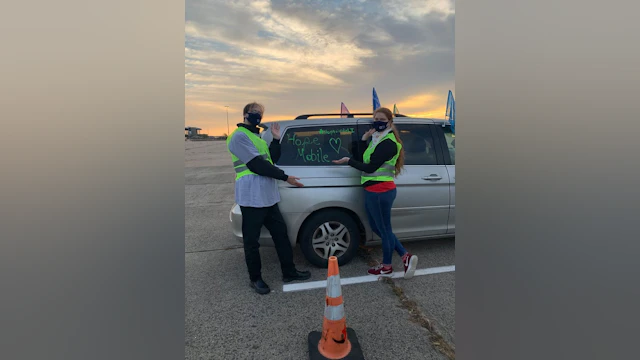When I took over as the Long Island Chapter Area Director for the American Foundation for Suicide Prevention in 2016, it was with the belief that more needed to be done to raise awareness about mental health and suicide prevention. My childhood friend lost her brother to suicide in 2011, and I remember the shock and the ripple effects it had on her family and in his community. I also remember feeling helpless, not knowing what to say or do, wishing I knew more. Having the opportunity to bring my professional experience to AFSP to grow the Long Island chapter and bring more awareness and education to the issue of suicide prevention was exciting for me.
The Out of the Darkness Walks are AFSP’s largest fundraising events, taking place each fall in over 400 communities across the country. The Community Walks have been growing each year, not only in terms of the dollars they raise, but also the number of people participating. The events give people the opportunity to meet others who have been affected by suicide, give them the courage to open up about their own struggles or losses, and provide them with a platform to change our culture’s approach to mental health.
When COVID-19 hit the United States last March, we were hopeful our October Long Island Community Walk, held at Jones Beach, would still be able to happen. Our planning committee was forced to begin plans through Zoom calls, and our initial meetings were still focused on an actual Walk happening. As the months progressed and the pandemic’s effects continued to paralyze the way we normally do business, we soon realized that was not going to be possible. Many of the AFSP chapters began planning virtual walks, and we considered doing that also. Toward the end of June, after several months of being isolated, we began talking about how we might be able to plan an event that we could have people physically attend, instead of a virtual event. We were all feeling the effects of not connecting with people after months of lock down, and wanted to find a way to allow participants to see other people in person.
Drive-in movies were happening all over. We asked ourselves, “What if we made the walk, a drive-in movie?” What we didn’t realize was how many obstacles we would face. Finding a screen large enough that could be seen during the day, instead of at night. Getting the okay from Jones Beach, a state park, to allow us to host the event, given all the restrictions the state had for gatherings of any kind. Getting our participants to continue to register and raise funds as if they were participating in a traditional walk, even though a walk couldn’t happen, and promising them a safe, meaningful event. Creating the digital presentation for the event in a tight timeframe, when people couldn’t get together to film. The changes, the details, and the uncertainty were at times overwhelming. But with Zoom calls, backyard social distancing, and the help of the New York Tech Carleton Group, a collaborative class with Communication Arts and Digital Art and Design (which functions as a student-run advertising and PR agency), and ProdCo, a student-run video production company, we planned, advertised, promoted, and produced a video that took the place of our traditional opening ceremony, and was deserving of the jumbo screen it was played on.
I’ve planned and organized many walks over the last 25 years, both as a volunteer, and as a not-for-profit Director. The 2020 Long Island Out of the Darkness Experience – our Drive-In Movie event – was the highlight of my career, the event I will remember forever, and the one I will be the most proud of. Despite bureaucracy, and despite a pandemic, we were able to organize an event over 700 people attended in about 250 cars, and offered them connection and hope, after months of isolation & uncertainty. Although participants were in their cars, there was so much energy! Rather than walking while wearing t-shirts with their team names on it, people decorated their cars with banners and glass markers.
The bead ceremony, always a highlight of our events, in which participants wear beaded necklaces to represent their personal connection to our cause (i.e. loss of a child, loss of a spouse, a personal struggle, supporting someone who struggles, etc.) was incorporated into the video shown on the big screen. Each story included was filmed at home on cellphones by participants we’d asked to tell why they were “walking,” and then brilliantly edited into the video by the ProdCo students. The video presentation was touching, and full of hope. Normally, walkers would have seen the different colored beads around everyone’s neck. At our Drive-In Movie event, they saw flags attached to the windows of the other cars participating, representing the colors of people’s connection to the cause. It was so powerful and meaningful, and honored those we have lost, and those who struggle. What we all experienced that night was so necessary right now.
Although the dollars raised were nowhere near where we had projected them to be before the world shut down, I consider this to have been the most successful event I have ever been a part of. I cried when it started, because up until two weeks earlier, we weren’t even confident we could pull it off. But we felt so strongly that it needed to happen. Together, we did it.
I know all of us have felt the effects of this pandemic, both personally and professionally. It has taken a toll on all of us. I am so grateful for all of my AFSP colleagues and the dedicated volunteers for all they do each and every day – especially those times when the odds feel as though they are against us.
Take that, COVID-19! HOPE WILL NOT BE CANCELLED!
